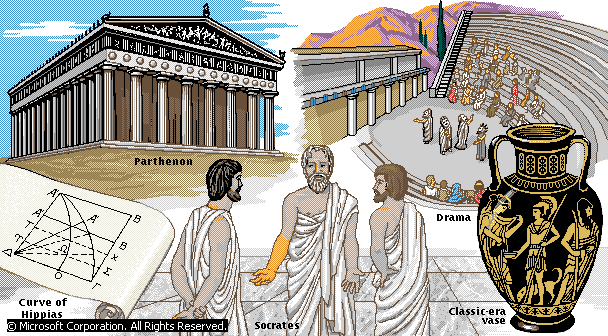Do the artisans know anything?
Extract B: After talking to the statesmen and public figures, Socrates goes to the poets and playwrights and finally to the artisans and craftsmen.
 |
| Arctitects as well as mathematicians, metalworkers, potters and painters |
Finally then I went to the hand-workers. [22d] For I was conscious that I knew practically nothing, but I knew I should find that they knew many fine things. And in this I was not deceived; they did know what I did not, and in this way they were wiser than I. But, men of Athens, the good artisans also seemed to me to have the same failing as the poets; because of practicing his art well, each one thought he was very wise in the other most important matters, and this folly of theirs obscured that wisdom, so that I asked myself [22e] in behalf of the oracle whether I should prefer to be as I am, neither wise in their wisdom nor foolish in their folly, or to be in both respects as they are. I replied then to myself and to the oracle that it was better for me to be as I am.
 |
| Athena, goddess of handicrafts |
Now from this investigation, men of Athens, [23a] many enmities have arisen against me, and such as are most harsh and grievous, so that many prejudices have resulted from them and I am called a wise man. For on each occasion those who are present think I am wise in the matters in which I confute someone else; but the fact is, gentlemen, it is likely that the god is really wise and by his oracle means this: “Human wisdom is of little or no value.” And it appears that he does not really say this of Socrates, but merely uses my name, [23b] and makes me an example, as if he were to say: “This one of you, O human beings, is wisest, who, like Socrates, recognizes that he is in truth of no account in respect to wisdom.”
Therefore I am still even now going about and searching and investigating at the god's behest anyone, whether citizen or foreigner, who I think is wise; and when he does not seem so to me, I give aid to the god and show that he is not wise. And by reason of this occupation I have no leisure to attend to any of the affairs of the state worth mentioning, or of my own, but am in vast poverty [23c] on account of my service to the god.
Questions worth thinking about
(1) Does Socrates' encounter with the artisans lead him to be doubtful or sceptical about the possibility of knowledge itself?
(2) Does knowledge such as these men (or their modern counterparts) have automatically lead them into false estimations of what life is all about? Why should Socrates believe that?
(3) Socrates claims again here that he knows that he doesn't know anything. What is it that he recognizes he knows nothing about for sure?
(4) He knows to them believing and then confirming that 'they knew many fine things', but he says, they had no clear idea about wisdom. This suggests that we may fairly infer that wisdom is knowledge of the finest things. So what might this knowledge be?
(5) If you know what honesty is or what courage is or generosity or reliability or some other virtue does that mean that the 'knowledge' you have is like the 'knowledge' that an architect or a navigator or a potter has? If it is why can't we teach people to be wise or honest or honest or reliable or generous the way we can teach them to build, navigate or throw and glaze pots? What don't we have A Levels in Honesty and Generosity in our schools? Why can't we have Honours Degrees (First Class) in Wisdom?
(5) If you know what honesty is or what courage is or generosity or reliability or some other virtue does that mean that the 'knowledge' you have is like the 'knowledge' that an architect or a navigator or a potter has? If it is why can't we teach people to be wise or honest or honest or reliable or generous the way we can teach them to build, navigate or throw and glaze pots? What don't we have A Levels in Honesty and Generosity in our schools? Why can't we have Honours Degrees (First Class) in Wisdom?
No comments:
Post a Comment